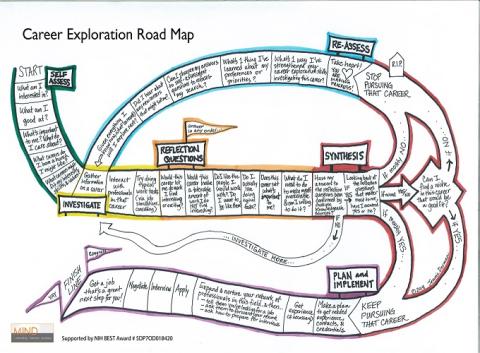Embarking on your graduate career can be exciting. You’re designing your own experiments, directing your own scientific inquiry, uncovering new knowledge. There’s so much to learn! It also comes with a unique set of challenges. There is a lack of structure – there’s no set end time, and the milestones along the way aren’t rigidly defined and often depend on you. You’re expected to work more independently than you have in the past. In addition, you may receive infrequent feedback on your work, and what you do hear is often critical.

The career exploration road map is a tool that was developed by Bill Lindstaedt and Jennie Dorman to help students/trainees visualize the career exploration process and track their progress. This tool was initially developed for graduate students and postdocs at the University of California, San Francisco, but is now available for all to use.

Word Cloud Created by Jodian Brown using the generator found at https://www.jasondavies.com/wordcloud/ Written by Jodian Brown, Ph.D., Computational Chemistry, IRTA Postdoctoral Fellow OD/OIR/OITE, National Institutes of Health Data science – it is a field of study that has exploded over the past few years. Consequently, there is a lot of interest from our trainees.
Post Doc Alumna: Anu Nagarajan, PhD
Industry Position: Senior Scientist
The OITE interviewed a NIH postdoctoral alumna who successfully landed a position in industry. She shares her career exploration process, job search strategies, and knowledge that she gained about her employability as a professional scientist.
OITE: Tell me the story about how you began to search for career options as post doc.

In 2014, to recognize Lesbian, Gay, Bisexual, Transgender, and Queer (LGBTQ) Pride month, the OITE Careers Blog published a post addressing job search and work environments for LGBTQ scientists called Happy Pride! This blog issue provides useful resources for scientists, their families, and allies in support of inclusive career decision-making and work environments.
On May 11, 2017 the OITE will again host the NIH Career Symposium! This year is special…we will celebrate its 10th anniversary. This event is one of our favorites, it highlights the multitude of career opportunities for biomedical scientists—and in the past decade over 7500 graduate students, postdocs and fellows have attended the event to propel their own careers. Our invited speakers tell us about their career paths, how they got their jobs, and advice to attendees as they plan their careers.
For many NIH PhDs and post-docs in the sciences, the formula that you learned to use to find a successful academic career has been straight -forward:
Graduate Degrees + Research +Publications + Academic Job Talks + Academic Achievements (BS through PhD) = Successful Careers
You may not know that after the Post-Doc, there are some additional skills that can be added to the job search equation. Here they are:
One of the current trends in the application process for industry positions is to use video interviewing. Currently, business, science, and technology companies are using video interviews as the first step in the interviewing process after a candidate applies for a position because it saves money and staff time for the firms to screen candidates prior to inviting them for face-to face interviews.
In the OITE we are often asked about the career paths of former postdocs. While we do not conduct mandatory exit surveys, we do have some data from the OITE NIH Alumni Database. This database is populated as fellows leave the NIH. To date it contains about 1100 entries. Of those, 639 contain career information that we have been able to analyze. Caveat: this information is only from former trainees who have voluntarily created entries in the database; it does not capture the full range nor percentage of actual career paths*.
One of the most challenging questions that developing scientists must answer is, “Should I pursue an academic or industry career?” For some, the pursuit of an academic career is their path of choice.

